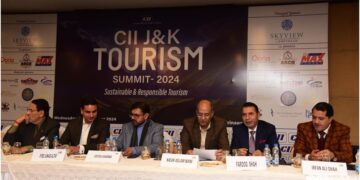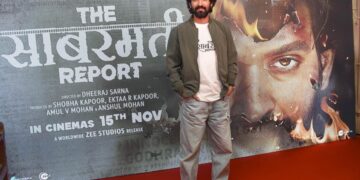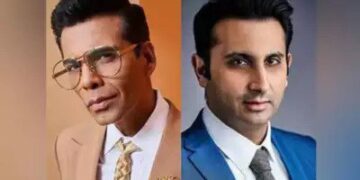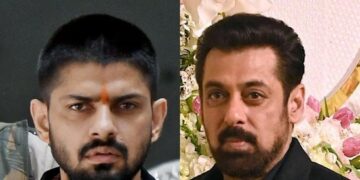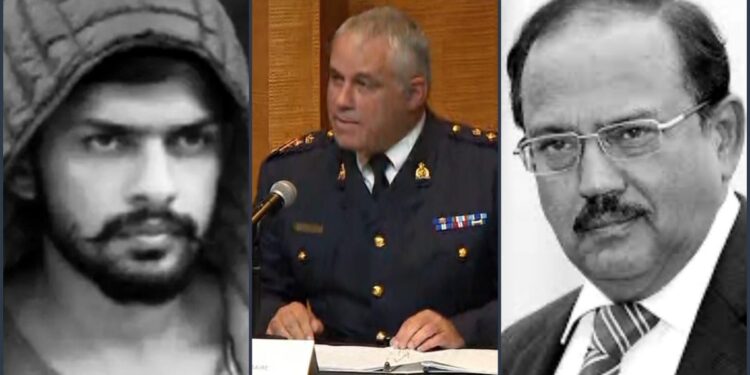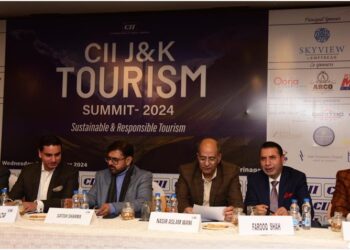New Delhi: The Canadian police have accused Indian diplomats in Canada of using the notorious Lawrence Bishnoi gang for “involvement in homicides, extortions and other criminal acts of violence” in the country and it is their request that India waive immunity for six diplomats so that they could be questioned about this – a demand the Indian side rejected – which triggered Ottawa’s decision to expel them. Meanwhile, a news report has it that Union home minister Amit Shah was allegedly involved in authorising intelligence-gathering and attacks. Canadian Prime Minister Justin Trudeau has also released a statement on the expelling.
The Canadian police went public with its allegations after relations between India and Canada reached their lowest point on Monday evening, with both sides expelling six diplomats, including their top envoys, in a day of fast-moving developments.
On Monday, Canada sent a formal diplomatic communication to India intimating it that six Indian diplomats, including the Indian high commissioner, were ‘persons of interests in a matter related to an investigation’ and that Royal Canadian Mounted Police investigators be allowed to question them. India described the Canadian charge as ‘preposterous’. A few hours later, the Canadian government declared the six persona non grata, prompting the Ministry of External Affairs to say the diplomats were being recalled for their own safety. The MEA subsequently announced the expulsion of six Canadian diplomats from India.
In Ottawa, Royal Canadian Mounted Police Commissioner Mike Duheme read out a statement to the media which spoke broadly about the “involvement of agents of the Government of India in serious criminal activity in Canada”.
“It is not our normal process to publicly disclose information about ongoing investigations, in an effort to preserve their integrity. However, we feel it is necessary to do so at this time due to the significant threat to public safety in our country,” he said at the press conference which was held on a public holiday in Canada.
Duheme stated that an RCMP task force had “evidence” covering four areas of activities: violent extremism impacting both countries, alleged connections tying agents of the Government of India to homicides and violent acts, the use of organized crime to create a perception of an unsafe environment targeting the South Asian community in Canada, and interference in democratic processes.
In his statement, Trudeau said:
“As the Commissioner of the RCMP, Mike Duheme, stated earlier today, the RCMP has clear and compelling evidence that agents of the Government of India have engaged in, and continue to engage in, activities that pose a significant threat to public safety. This includes clandestine information gathering techniques, coercive behaviour targeting South Asian Canadians, and involvement in over a dozen threatening and violent acts, including murder. This is unacceptable.”
Trudeau added that Canada “will never tolerate the involvement of a foreign government in threatening and killing Canadian citizens on Canadian soil – a deeply unacceptable violation of Canada’s sovereignty and of international law.”
“Once again, we call on the Government of India to co-operate with us on this investigation – to put an end to its inaction and misleading rhetoric; to recognize the credibility and severity of the evidence and information we have shared so far; and to reiterate, in no uncertain terms, that its position on extrajudicial operations abroad will henceforth be unequivocally aligned with international law.
Secret meeting with NSA Doval in Singapore and Amit Shah
He revealed that earlier this week Canadian deputy commissioner of federal policing Mark Flynn had attempted to discuss the matter and “present evidence pertaining to agents of the Government of India’s involvement in serious criminal activity in Canada.”
“These attempts were unsuccessful, therefore deputy commissioner Flynn met with officials of the Government of India, along with the national security and intelligence advisor (NSIA), Nathalie Drouin, and deputy minister of foreign affairs David Morrison over the weekend,” he stated.
In a latter part of the press conference, the RCMP official stated that the meeting took place in Singapore on October 12, but did “not meet the objectives that we wanted to make sure that we could collaborate and work together”.
The Indian government has not made any comment on the hitherto unpublicised October 12 meeting in Singapore.
While the RCMP did not mention the name of the Indian government official who allegedly met with the Canadian NSA in Singapore, The Washington Post claimed that national security adviser Ajit Doval was present at the five-hour long meeting.
It was at that meeting that Canadian officials, as per the Post report, gave “evidence” of the Lawrence Bishnoi gang networks and their operational links to Indian diplomats:
“When Canadian officials outlined evidence that India had enlisted Bishnoi’s gang networks in Canada to carry out the Nijjar killing and other attacks, Doval initially “pretended not to have any idea who the guy was,” a Canadian official said. Later, however, Doval began rattling off “facts, figures and anecdotes” about Bishnoi, acknowledging that he “was capable of orchestrating violence from wherever he is incarcerated” and “was known to be up to no good from his jail cell.”
The Post also quoted Canadian officials as saying they sought the meeting with Doval “to warn that details exposing Indian involvement in attacks were likely to become public as prosecutors move forward next month with a planned trial of four suspects in Nijjar’s killing.” However, the meeting hit a dead-end: “Doval made clear that India ‘would deny any link to the Nijjar murder and any link to any other violence in Canada no matter what the evidence was,’ a senior Canadian official said.”
RCMP alleges India government, Bishnoi gang link to one more murder in Canada
The senior RCMP official said that the “evidence also shows that a wide variety of entities in Canada and abroad have been used by agents of the Government of India to collect information”.
“Some of these individuals and businesses were coerced and threatened into working for the Government of India. The information collected for the Government of India is then used to target members of the South Asian community,” he said.
Another senior RCMP official present at the press conference publicly named gangsters of the Lawrence Bishnoi group that she claimed were working in tandem with the Indian government.
“But what we’ve seen is, is from an RCMP perspective is the use of organized elements and I will say what we, and it’s been publicly attributed and claimed by one organized crime group in particular, which is the Bishnoi group…So that’s what we’re seeing here in Canada. And we believe that that group is connected to agents of the government of India,” said Assistant Commissioner Brigitte Gauvin.
Bishnoi, currently imprisoned in Gujarat, has publicly claimed responsibility for several high-profile murders, including the recent shooting of a Maharashtra politician in Mumbai. He also took responsibility for the killing of Hardeep Singh Nijjar last September, shortly after Canadian Prime Minister Justin Trudeau stated that there were “credible” allegations of Indian government agents being involved in the incident.
Bishnoi operates his network from jail without apparent impediment. Last year, a video surfaced of him conversing with Bajrang Dal extremist Monu Manesar, accused of a double murder in Haryana.
The Canadian police officer also stated that besides the Bishnoi gang, there were also other organised crime groups but which would not be named at this stage.
In answer to a question, the senior RCMP officer said that “approximately eight individuals have been arrested and charged in relation to homicides” and “at least 22 individuals” have been “arrested and charged” with extortion. “Some of these have connections to the government of India,” added Gauvin.
Canada’s top Mountie also stated that “well over a dozen credible and imminent threats to life which have led to the conduct of Duty to Warn by law enforcement with members of the South Asian community, and specifically members of the pro-Khalistan movement”
The Post article stated that Canada had “uncovered evidence of Indian government involvement in home invasions, drive-by shootings, arson, and at least one additional killing.”
This killing reportedly refers to the death of Sukhool Singh, who was shot in Winnipeg two days after Canada publicly accused India of being involved in Nijjar’s killing and just a day after he was included in a list of wanted gangsters released by the National Investigation Agency.
According to Gauvin, the activities of the Indian diplomats were “without a doubt, a contravention of the Vienna Convention on Diplomatic Relations, but also it goes against Canada’s values as a society”.
‘Evidence will become public in court’
In November 2023, US prosecutors revealed a sealed indictment charging Indian national Nikhil Gupta with attempting to murder pro-Khalistani lawyer Gurpatwant Singh Pannun of the banned Sikhs for Justice group. The indictment alleged that Gupta sought to hire a hitman—who was, in fact, an undercover law enforcement operative—on the orders of an unnamed but identified Indian government official. It had also linked the US conspiracy to murder case with the Nijjar killing in Canada.
When pointed out that Canadian police had not provided enough public evidence unlike the US indictment, RCMP Commissioner Duheme said that the Canadian judicial process “is not set up that way”. “Individuals when they’re charged have a right to a free trial. The disclosure process occurs once the charge is laid, and disclosures are made before the courts. That’s when the information becomes accessible because you’d question if you reversed it in our judicial system right now, what kind of fair process would the accused get if we disclosed all the information before the charge? Two different judicial processes exist in two different countries”.
US says Indian inquiry committee in Pannun matter is headed to Washington
On the same day that India and Canada’s relations took a downturn, a US State Department spokesperson announced that an Indian inquiry committee, set up to investigate allegations in the indictment, was travelling to the US to discuss the matter and “receive an update” from US authorities.
“Additionally, India has informed the United States that they are continuing efforts to investigate other connections of the former government employee and will determine follow-up steps as necessary,” the spokesperson said.
Unusually, this statement was later deleted from the website of the US state department after being circulated.
Earlier on Monday, India had announced that it was withdrawn its High Commissioner Sanjay Kumar Verma and other diplomats after they received notice that they were ‘persons of interest’ in an investigation. It accused Trudeau of being “consistently hostile” towards India.
“It was underlined that in an atmosphere of extremism and violence, the Trudeau Government’s actions endangered their safety. We have no faith in the current Canadian Government’s commitment to ensure their security. Therefore, the Government of India has decided to withdraw the High Commissioner and other targeted diplomats and officials,” the statement from Ministry of External Affairs said.
It was announced after the Canadian Charge d’Affaires was summoned to inform that “baseless targeting” of Indian diplomats and officials in Canada was “completely unacceptable.”
Thereafter, Canada announced that it had served expulsion order against six Indian diplomats.
India had been “asked to waive diplomatic and consular immunities and to cooperate in the investigation” by allowing RCMP to interview the Indian diplomats, the Canadian foreign ministry said. “Regrettably, as India did not agree and given the ongoing public safety concerns for Canadians, Canada served notices of expulsion to these individuals. Subsequent to those notices, India announced it would withdraw its officials,” it said.

